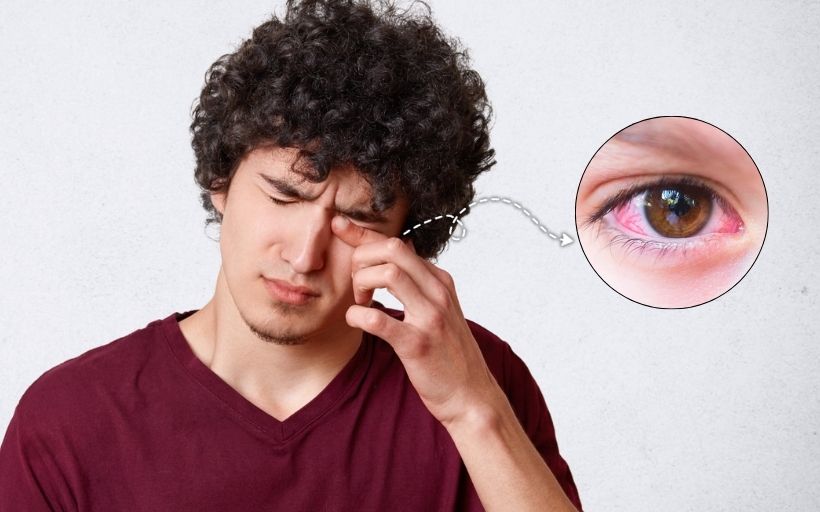Conjunctivitis, a common eye infection, also known as "pink eye," is an inflammation of the conjunctiva—the thin, transparent tissue that lines the inside of your eyelids and covers the white part of your eye. While it may sound alarming, conjunctivitis is often treatable and, in many cases, resolves on its own. However, understanding its symptoms, causes, and treatment options is essential to managing this condition effectively.
Symptoms of Conjunctivitis
The signs of conjunctivitis can vary depending on the cause but typically include:
- Redness: The eye may appear bloodshot due to the inflamed blood vessels in the conjunctiva.
- Irritation or Itchiness: Many people experience an uncomfortable sensation, often described as a burning or itchy feeling.
- Discharge: Depending on the type, the eye may produce a watery or thick yellow/green discharge.
- Swollen Eyelids: Puffiness around the eyes is common.
- Crusty Lashes: In bacterial conjunctivitis, you may notice crusting on the lashes after sleep.
- Light Sensitivity: Some people experience discomfort when exposed to bright light.
If you are experiencing any of the above symptoms, it’s important to consult an eye specialist in Chinchwad at Omkar Eye Hospital to determine the cause and appropriate treatment.
Causes of Conjunctivitis
Conjunctivitis can be caused by various factors, including:
- Viral Infections: The most common type of conjunctivitis is caused by viruses, such as those responsible for the common cold. It spreads easily and is highly contagious.
- Bacterial Infections: Bacterial conjunctivitis, often caused by staphylococcal or streptococcal bacteria, leads to a thick, sticky discharge and requires antibiotics for treatment.
- Allergic Reactions: Allergic conjunctivitis occurs due to triggers like pollen, dust, or pet dander. It is not contagious and typically affects both eyes.
- Irritants: Exposure to smoke, chlorine in swimming pools, or chemical fumes can also cause conjunctivitis.
- Contact Lens Use: Poor hygiene or prolonged use of contact lenses can irritate the eyes, leading to conjunctivitis.
Treatment Options for Conjunctivitis
The treatment for conjunctivitis depends on its cause:
- Viral Conjunctivitis: No specific treatment is usually required; the infection clears up on its own within 1-2 weeks. Use cool compresses and lubricating eye drops to soothe irritation. Avoid sharing towels or personal items to prevent spreading the virus.
- Bacterial Conjunctivitis: Antibiotic eye drops or ointments are prescribed to eliminate the infection. Ensure proper hygiene and avoid touching your eyes unnecessarily.
- Allergic Conjunctivitis: Doctor-recommended antihistamine drops or oral medications can help alleviate symptoms. Identifying and avoiding triggers is crucial for long-term relief.
- Irritant-Induced Conjunctivitis: Rinse the eyes with clean, lukewarm water to flush out the irritant. If symptoms persist, consult an eye specialist in Chinchwad for further guidance.
General Tips for All Types:
- Avoid wearing contact lenses until the symptoms resolve.
- Wash your hands frequently to minimize the risk of infection.
- Use disposable tissues to clean the eyes and discard them immediately.
When to See a Doctor
While mild cases of conjunctivitis can often be managed at home, it’s essential to seek professional care if:
- Symptoms persist or worsen after a few days.
- You experience significant pain, blurred vision, or sensitivity to light.
- There is a thick, yellow-green discharge that continues to form crusts.
Visiting the Best Eye Hospital in Pimpri Chinchwad ensures you receive expert diagnosis and treatment tailored to your needs.
Prevention is Key
Preventing conjunctivitis involves simple but effective measures:
- Practice good hygiene, such as washing your hands and avoiding touching your face.
- Avoid sharing personal items like towels, makeup, or eye drops.
- Regularly clean and replace contact lenses as advised by your doctor.
- Protect your eyes from allergens and environmental irritants.
Final Thoughts
Conjunctivitis may be common, but it can be uncomfortable and inconvenient. Timely diagnosis and treatment can prevent complications and restore eye health quickly. Whether it’s a viral, bacterial, or allergic form of conjunctivitis, taking appropriate steps and consulting an eye specialist can make all the difference.
For expert care and personalized treatment, trust Omkar Eye Hospital, the Best Eye Hospital in Pimpri Chinchwad, where your vision and eye health are a priority.


